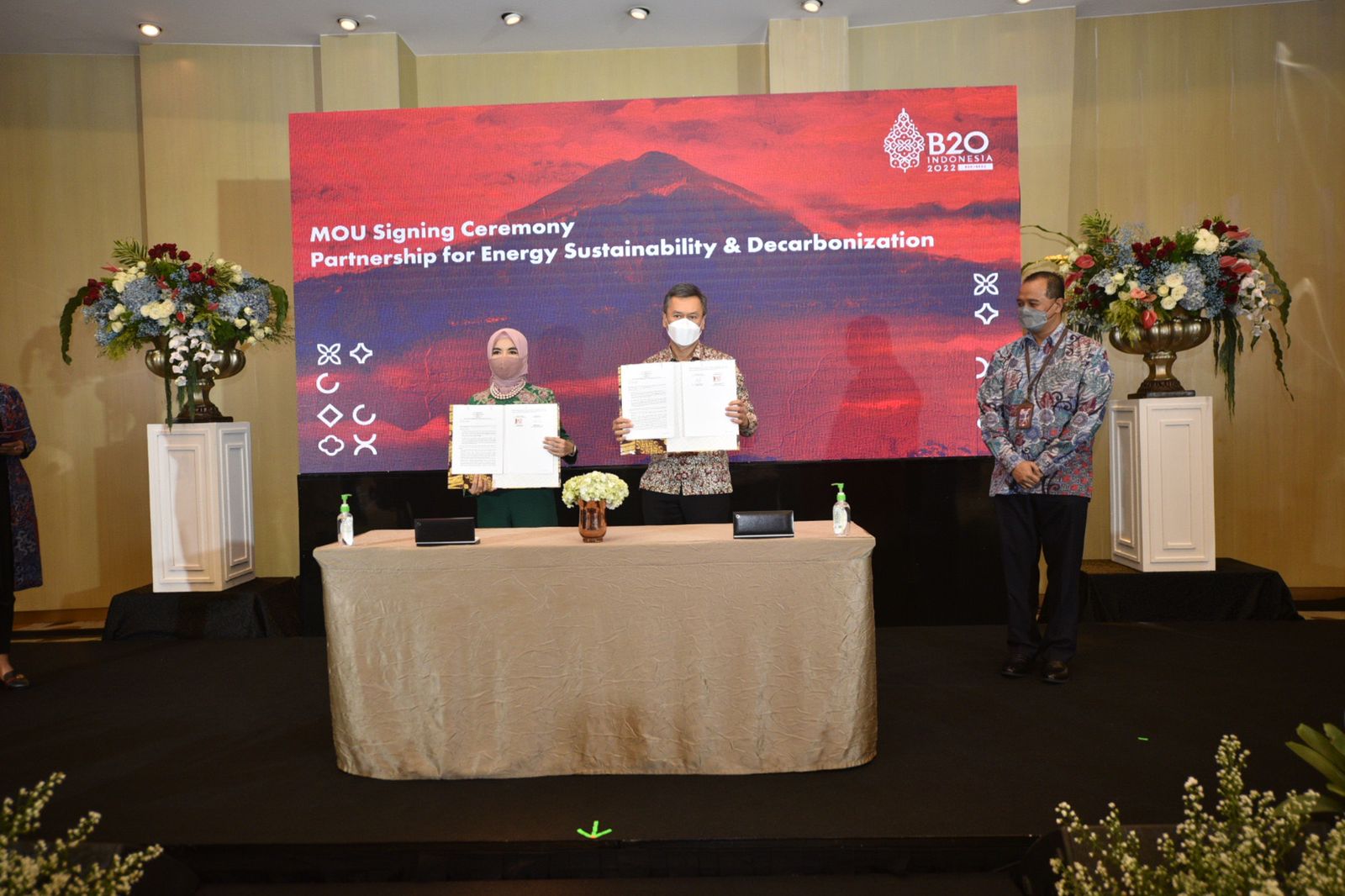
Business Action in Task Force B20, Pertamina Agrees on 4 Strategic Partnership Opportunities for Energy Sustainability and Decarbonization
Jakarta, January 18, 2022 – Pertamina is moving quickly to realize strategic steps in the energy sustainability and decarbonization program, following President Joko Widodo's direction in preparation for the G20 Presidency in 2022. It is also a part of The Business 20 (B20), Task Force Energy, Sustainability, and Climate, led by President Director of PT Pertamina (Persero) Nicke Widyawati.
The Memorandum of Understanding was signed on January 18, 2022, to coincide with the agenda of the Stakeholders Consultation by the B20 Task Force on Energy, Sustainability, and Climate. Pertamina collaborates with several key national and international partners. The goal of the collaboration is to undertake research and look at net-zero emission breakthroughs, such as technology, environmentally friendly energy, carbon offsets, and other possible collaborations.
For the first Memorandum of Understanding, Pertamina and Jababeka agreed to collaborate in the identification and evaluation of the Green Industrial Estate's development. It will include gas supply, electricity from New & Renewable Energy, research, and innovation.
Furthermore, Pertamina and Inpex Corporation (Inpex) also plan to explore opportunities for joint development of Clean-LNG and Clean-Gas supplies from the Bontang LNG terminal. This collaboration is intended to jointly produce a clean, carbon-free LNG at the Bontang Terminal, including offsets through carbon credits that can be provided by physically clean gas/LNG produced in Indonesia.
Efforts to support emission reductions through the development of new and renewable energy, as well as to achieve net-zero emissions and promote climate goals were also agreed by Pertamina with Chiyoda Corporation (Chiyoda) by conducting a collaboration study on the application of Carbon Capture, Utilization, and Storage (CCUS) technology and hydrogen production.
Not only Pertamina as Holding, Sub Holding Pertamina New & Renewable Energi (PNRE) and Subholding Commercial & Trading (C&T) also cooperates with PT Grab Teknologi Indonesia and PT Sepeda Untuk Indonesia to explore the development of the Electronic Vehicle (EV) ecosystem. Particularly, related to the battery business and battery swap systems to improve EV vehicle design.
Nicke said the Memorandum of Understanding realizes policy recommendations to the government, and also shows how the G20 can encourage the realization of what has been announced. "Therefore, we have signed four collaborations, all of which are to support the government's program to achieve net-zero emissions by 2060 and whose medium term is to reduce carbon emissions in 2030 between 29%-41%," said Nicke.
Regarding B20, Nicke added, there are three themes raised. It includes innovation, inclusivity, and collaboration. "Three things must be realized in terms of realizing the government's target for net-zero emissions. Therefore, with the signing earlier, we also opened the cooperation," said Nicke.
Nicke added, two things have been critical issues that have made the increase in new renewable energy not run as fast as expected. The first is technology. Indonesia has a very large energy source, but still requires technology and innovation, and creativity that can process these resources into environmentally friendly energy sources.
The second is access to funding. Therefore, at B20 there is a special task force discussing this funding, one of which is the issue of green funding, which discusses the development of new renewable energy, which will increase.
Nicke also discussed the issue of affordability or financial ability related to the energy transition. Until now, with the technological developments that have taken place, this new and renewable energy is still considered to have a higher price compared to fossil energy.
"So affordability is an essential focus of discussion because this is not only the price of energy itself but also changes to renewable energy. It will also push towards people's purchasing power," said Nicke.
For that, said Nicke, what must be done now is create a program that can balance these things so that the government's target for net-zero emissions by 2060 is achieved. "This is our joint task to formulate it. Because apart from innovation, collaboration with developed countries which themselves allocate some funds for the development of renewable energy and encourage energy transition in developing countries, we also have to discuss this," said Nicke.
Not only big business, continued Nicke, MSMEs in developing countries must also be considered. Nicke assessed that the policy recommendations that will be proposed later must have a good impact on the MSME sector. More than 90% of Indonesian workers are absorbed in the MSME sector, and the contribution of MSMEs to the national economy is around 64%.
"MSMEs are an important factor because they become the strength of developing countries including Indonesia when facing a crisis. If these SMEs can be stable, the recovery will also be faster," said Nicke.
The signing ceremony was attended by Deputy Chair of Task Force Energy, Sustainability, & Climate B20 Agung Wicaksono, Director of Strategy, Portfolio and Business Development of PT Pertamina (Persero) Iman Rachman, President Director of PT Jababeka Tbk., Budianto Liman, Director - Senior Managing Executive Officer of Global Energy Marketing Division Inpex Shigeharu Yajima, SVP - Division Director - Business Development Division Chiyoda Corporation, Mr. Hideo Matsui, President Director of PT Grab Teknologi Indonesia Ridzki D. Kramadibrata and Director of PT Bikes for Indonesia Ika Sari Dewi.**